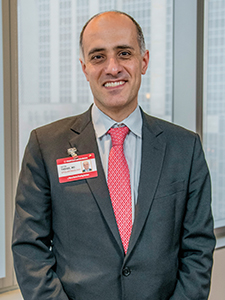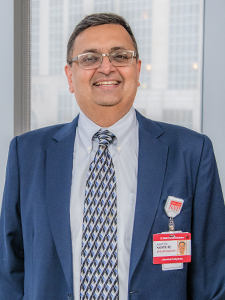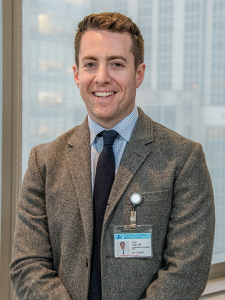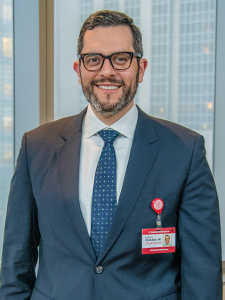Rhinology and Endoscopic Skull Base Surgery Fellowship
Now entering its second year, the Rhinology and Endoscopic Skull Base Surgery Fellowship program established by the Departments of Otolaryngology — Head and Neck Surgery at NewYork-Presbyterian combines the clinical, surgical, and research expertise of the outstanding rhinology faculty at NewYork-Presbyterian/Weill Cornell Medical Center and NewYork-Presbyterian/Columbia University Irving Medical Center. The one-year program provides training under the mentorship of four highly skilled, fellowship-trained rhinologists and skull base surgeons: Fellowship program Co-Directors Abtin Tabaee, MD, and Ashutosh Kacker, MD, and rhinology fellowship faculty David A. Gudis, MD, and Aaron N. Pearlman, MD. Together they bring an exceptional level of experience and expertise to the training of fellows in the management of diseases and disorders affecting the nasal cavity, paranasal sinuses, and anterior skull base.
While the origins of rhinology date back to the 18th and 19th centuries with the development and evolution of nasal septal surgery, the pivotal moment in the field came in the 1950s with the introduction of the rigid endoscope. Technology, research advances, and the concurrent improvement in imaging have led to the rapid development of endoscopic surgical technique over the past 20 to 30 years.
The rapidly growing field of rhinology — a subspecialty of otolaryngology that focuses on pathology of the sinonasal cavity and the skull base — very often has been at the forefront of introducing new technology and surgical approaches in otolaryngology. Indeed, many of the early techniques and approaches in rhinology and skull base surgery were pioneered at NewYork-Presbyterian.
“Rhinology and endoscopic skull base surgery have a long track record at Weill Cornell,” says Dr. Abtin Tabaee, an otolaryngologist at NewYork-Presbyterian/Weill Cornell. “Many of the luminaries in the field, such as Dr. Ted Schwartz, a neurosurgeon at Weill Cornell, and Dr. Vijay Anand, an otolaryngologist at Weill Cornell, have set a prestigious level of expertise for decades now. The program here has evolved, and faculty have expanded in terms of the presence of rhinology at both campuses. We now have four fellowship-trained rhinologists at NewYork-Presbyterian and outstanding multidisciplinary faculty who participate in the rhinology clinical care and educational experience for our fellows.”

“We offer a multidisciplinary approach to training and education based on each fellow spending time with multiple experts in the operating room and in the office, enabling them to receive a comprehensive clinical, surgical, and academic experience.”
— Dr. Abtin Tabaee
“The fellowship experience has truly matured within the past decade with the emergence of rhinology as a distinct subspecialty within otolaryngology,” says Dr. Tabaee. “Indeed, the complexity involved in managing the full spectrum of advanced disease processes involving the paranasal sinus and anterior skull base region necessitates formal fellowship training.”
According to Dr. Tabaee, the training mission of the NewYork-Presbyterian program is to produce a comprehensive educational experience for the fellow that encompasses expertise in all of the surgical domains of rhinology and endoscopic skull base surgery, strong competency in clinical care in the office setting, and development of a foundation in academic medicine. “Our program provides a robust surgical, clinical, and academic experience at both the Weill Cornell and Columbia campuses,” he says. “We are looking to develop expert clinicians, skilled surgeons, and future leaders in the field. We have an established pedigree and expertise among the faculty members and believe we’ve done an exceptionally strong job of making this a great training experience for the fellows.”
“A successful year-long fellowship includes an emphasis on medical management,” notes Dr. Aaron Pearlman, an otolaryngologist at NewYork-Presbyterian/Weill Cornell. “You want the fellows to have high exposure and be able to gain a skillset, as well as a higher-level understanding of disease process. I teach chronic inflammatory disease. What I am trying to communicate is more than just the physical act of doing a surgery; it’s also understanding the disease in a more thoughtful way and applying that understanding to each patient. It’s not about one size fits all.”
That understanding of a patient’s needs begins with the first meeting, adds Dr. Pearlman. “In the clinic, I want the fellow to start thinking about the patient’s complaint and past treatments, formulating an understanding of the patient’s history, and then coming up with a treatment plan. We’re talking about an inflammatory disorder that we are trying to treat with surgery. Some people improve with surgery, but the problem is likely a medical disorder and you have to think about it in that way.”
Strength in Diversity
“A unique strength of our training is that not only do we have different experts in the field involved in our education, but the fellows spend a meaningful amount of time at two distinct hospital centers,” says Dr. Ashutosh Kacker, an otolaryngologist at NewYork-Presbyterian/Weill Cornell. “The Columbia experience and the Weill Cornell experience each draws from a different patient population and yet complements each other in various procedural aspects. It’s an especially important educational piece for the fellows to see the full breadth of our field handled in different ways at the two campuses.”

“The Columbia experience and the Weill Cornell experience each draws from a different patient population and yet complements each other in various procedural aspects. It’s an especially important educational piece for the fellows to see the full breadth of our field handled in different ways at the two campuses.”
— Dr. Ashutosh Kacker
Dr. David Gudis, an otolaryngologist at NewYork-Presbyterian/Columbia, who is dual fellowship trained in rhinology and skull base surgery and pediatric otolaryngology, agrees that the diversity in teaching skills and expertise benefits fellows. “Combining the expertise at both campuses provides a range of faculty background, training, practice, technique, and style that I think contributes significantly to the training opportunity,” says Dr. Gudis. “In the surgical experience, if you are able to see how four different surgeons do the same type of operation, and you spend a year just doing that over and over again, you can find your own style and choose what you think are the best and most sensible techniques and approaches. In my own education, I trained with two outstanding rhinologists who could not be more different from one another. Those differences were the best part of my fellowship. I learned so much during only one year and was very grateful.”
Applying Surgical Advances
As a faculty instructor, Dr. Gudis imparts his expertise in advanced endoscopic skull base surgery using complex transnasal and transoral approaches that are heavily dependent on technology. “Today, more refined imaging techniques and navigation devices allow us to have higher levels of precision when dissecting around critical anatomic structures, such as the optic nerve and the carotid artery,” says Dr. Gudis. “We are hoping to create a lineage of academic and expert rhinologists who have trained here and go on to practice around the country, advancing this subspecialty field.”

“In my own education, I trained with two outstanding rhinologists who could not be more different from one another. Those differences were the best part of my fellowship.”
— Dr. David A. Gudis
The modern endoscopic era, coupled with a better understanding of sinonasal physiology and anatomy, has broadened the scope of rhinologic practice dramatically. “The technology is continuously evolving,” adds Dr. Tabaee. “More tools are available now that allow us to do refined tissue resection while preserving critical structures. The greatest application of these techniques is the ability to perform advanced procedures for patients with refractory inflammatory disease and advanced neoplasms, providing a new avenue of treatment for our most complex patients.”
Fellows also hone their surgical skills in more complex endoscopic procedures aided by the latest advances in intraoperative navigation, including intraoperative CT scan imaging. “The data can also be used for image guidance and to create a virtual 3-D model,” says Dr. Kacker. “We can obtain a new data set during surgery, which allows us to do a more complete resection. This system is certainly very helpful with bony tumors enabling us to confirm that we’ve removed the entire tumor. Our fellows also benefit from our comprehensive tumor program involving the skull base, working in conjunction with neurologists, neurosurgeons, and critical care specialists.”
Broad-Based and Collaborative Research Opportunities
Research is a key component of the program and fellows actively participate in clinical projects and scholarly activities. The majority of the experience targets clinical research, but collab-orative opportunities exist for basic science and translational research at both Weill Cornell and Columbia.

“A successful year-long fellowship includes an emphasis on medical management. You want the fellows to have high exposure and be ableto gain a skillset, as well as a higher-level understanding of disease process.”
— Dr. Aaron N. Pearlman
“My role as a general instructor includes both clinical care teaching, as well as surgical care and research,” says Dr. Pearlman. “My research focus is on chronic inflammatory disease of the nose and paranasal sinuses. One of the fellows and I are collaborating on a study to look at differences in commonly used medicated stents in the immediate postoperative setting for sinus surgery.”
The Weill Cornell clinicians are also pursuing outcomes research for endoscopic skull base surgery. “In the last few years we have developed and contributed to quality-of-life outcomes, looking at how patients do after long-term follow-up in terms of tumor control, as well as sinus and nasal function,” says Dr. Tabaee.
For More Information
Dr. David A. Gudis | [email protected]
Dr. Ashutosh Kacker | [email protected]
Dr. Aaron N. Pearlman | [email protected]
Dr. Abtin Tabaee | [email protected]
NewYork-Presbyterian Departments of Otolaryngology – Head and Neck Surgery Rhinology and Endoscopic Skull Base Surgery Fellowship at a Glance
The core curriculum of the fellowship program includes:
- Development of surgical skills by actively participating in surgical procedures encompassing the full spectrum of rhinologic and endoscopic skull base surgery
- A comprehensive experience with multiple faculty preceptors who provide a platform for mastering perioperative care and surgical principles and techniques
- Development of expertise in the medical care of rhinologic disorders, facilitated by collaboration with fellowship faculty in the outpatient office setting. In addition to assessment and medical treatment, fellows are exposed to the office procedures commonly performed in rhinology.
- Dedicated time spent developing a foundation in the care of allergy patients under the direction of otolaryngologic allergy faculty
A comprehensive and high volume surgical experience forms the foundation of the program. Fellows receive training in:
- Routine endoscopic sinus surgery
- Surgery for nasal obstruction
- Advanced endoscopic surgery for inflammatory sinusitis (revision surgery, endoscopic frontal sinus surgery)
- Endoscopic skull base and intracranial surgery for sinonasal and intracranial neoplasms, CSF leak, meningoencephalocele
- Endoscopic surgery of the orbit (endoscopic dacryocystorhinostomy, orbital decompression)
- Open approaches to the paranasal sinuses



